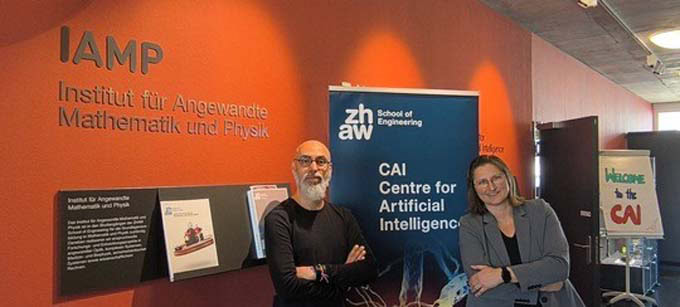Unique insights into lighthouse projects at the 39th Zurich Logistics Colloquium
Pioneering developments are also necessary - and possible - in logistics! This was demonstrated on April 23, 2024 at the 39th Zurich Logistics Colloquium of Dr. Acél & Partner AG in collaboration with ETH Zurich, Institute for Machine Tools and Production (IWF), with its lighthouse projects "Agile & Sustainable".

According to the organizers, the Zurich Logistics Colloquium in the Lecturers' Foyer at ETH Zurich with three inspiring practical presentations and around 60 guests from industry and business was once again a complete success.
Sustainable logistics in the steel industry
After the welcome address by Dr. Peter Acél and Prof. Dr. Konrad Wegener, Fabian Gerdes, Head of Outbound Logistics at Salzgitter Flachstahl GmbH, kicked off the lecture series. Under the title "Logistics for Circular Solutions", he spoke about the goals of transporting steel and raw materials sustainably in cycles and the contribution of steel production to achieving climate targets.
After a brief introduction to the Salzgitter Group, Gerdes went into detail about the measures it is taking to achieve greenhouse gas neutrality. He focused on a solution developed in-house. Thanks to the Salzgitter Low CO2 Steelmaking (SALCOS®), the so-called Carbon Direct Avoidance (CDA) process and the use of hydrogen instead of carbon as a reducing agent is intended to produce almost CO2-free steel and by 2033 over 95% of CO2-emissions can be reduced.
The next challenge lies in transporting green products in a green way. Around 11.5 million tons of material are transported inbound every year, and around 3.25 million outbound by rail, truck or barge. Transportation is increasing, while the general infrastructure is stagnating. Salzgitter Flachstahl has therefore taken it upon itself to develop sustainable and innovative solutions. These include the new train inspection concept "Ontrail", camera bridges that use AI on trains to detect how damaged the covers are and whether the goods can arrive dry at the customer. Fabian Gerdes also reported on the development of an electrically powered inland waterway vessel that can still sail even when the water level is low.
Multiple reprocessing of used tools
The second presentation was given by Rico von Burg, Product Manager at Fraisa SA in Bellach, on the logistics of reconditioning tools that have already been used. Fraisa specializes in the manufacture of precision tools, including custom-made products and the reconditioning of worn tools.
This led von Burg on to Fraisa's core competence: FRAISA ReTool®. This service includes the rapid reconditioning of tools that have already been used so that they can be used again for the same work - with a 100% performance guarantee. This sets Fraisa significantly apart from its competitors, who merely downcycle worn tools. On average, tools can be reconditioned 2.3 times. A DataMatrix code, which contains all the information about the product, helps to ensure that the One Piece Flow works with around 350,000 refurbishments per year and that unique and complex tool geometries or individual customer requests can also be taken into account. Orders can thus be combined, but tools can still be controlled individually through the fully automated production process.
Thanks to digital processes and autonomous machine operation, employees are deployed much more efficiently. And of course, using freshly reconditioned tools instead of newly produced ones saves over 50% of CO2.
When a retailer becomes a manufacturer...
The third and final topic at this logistics colloquium was presented by Dr. Peter Rutishauser, founder of Equatis AG. Entitled "From wholesaler to brand manufacturer", his presentation dealt with the rebuilding of a Europe-wide supply chain after the previous supplier went bankrupt. Rutishauser based his presentation on the example of the company Trisport. Trisport distributed fitness equipment of the Kettler brand. The problem: Kettler had to file for insolvency three times. In the first two incidents, Rutishauser worked with Trisport to forge a plan B, which then came to fruition in the third insolvency. Trisport acquired the trademark rights to Kettler sports equipment. However, it was now faced with the enormous challenge of rebuilding the activities without transferring operations and without their legacy and ensuring market supply with as little interruption as possible.
In order to achieve this, new concepts were needed: streamlining the product range, adjusted quantity planning and strengthening the dealers' trust in the company on the one hand, but also in the Chinese manufacturer of the appliances. Dr. Acél & Partner AG played a key role in setting up the new logistics chain from the producer in China to Europe, helping to establish Europe-wide distribution within 6 weeks. The conclusion that Rutishauser draws from the project is that this entire undertaking would hardly have been so successful without a strong personal network within and outside the company.
After a concluding discussion round and a closing speech by Prof. Dr. Konrad Wegener, the participants took the opportunity to exchange ideas and network over a delicious aperitif and, despite the dreary weather, with an impressive view of the city of Zurich and the lake.
Source and further information on the next Zurich Logistics Colloquium: Dr. Acél & Partner AG









